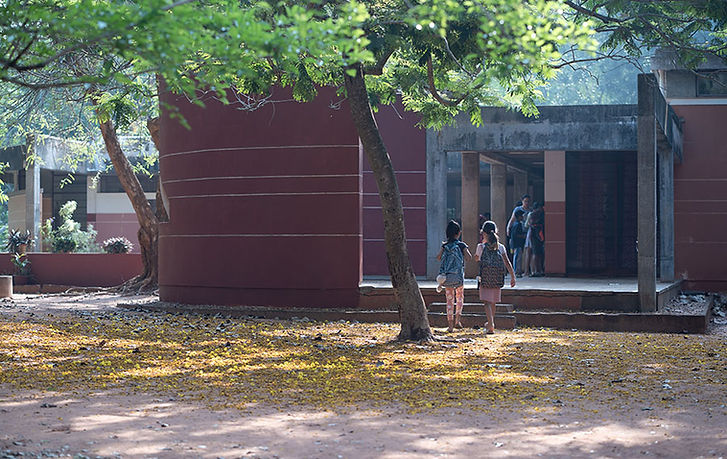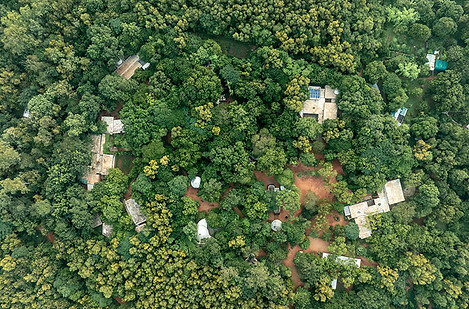For Children of 6-14 Years of Age
Welcome to Transition School
Integral Education in Auroville
Established in 1984, Transition School is a primary and middle school located in Auroville for children aged 6-14 years. The school consists of 8 groups, with a total of around 160 students representing 19 countries and multiple states of India. Class sizes are a maximum of 20 students.
Our Aim
Fostering Human Unity Through Education
Inspired by the teachings of Sri Aurobindo and the Mother, Transition School aims to help our children develop integrally, foster human values and promote human unity. The material development of the school and programme is constantly adapting to the needs of the children, and of Auroville. Our research on Integral Education is constantly evolving and expanding, with the aim to guide children towards a lifelong process of individual development and self-discovery.


Our Approach
Transition School’s objective is to help children develop from inside out and cultivate all aspects of the being, all inherent faculties, and essential skills for the full expression of the being in this life.
While nurturing the contact with the deeper and truer part of their being, we hope to help children grow towards becoming fulfilled adults that have a sense of purpose and direction in life.
Our Programme &
Underlying Curriculum
Our programme is divided in two parts. The first part is a whole-school Base Programme, which is the deep fabric of the school and provides the foundation and the meaning to the Transition School learning experience. The second comprises the specific adaptable programme of each subject that is based upon and fosters the Base Programme, or ‘Underlying Curriculum’.
The Base Programme
The Base Programme that permeates and supports the whole work and life experience at Transition School is built on five pillars:
-
The goal of the school
-
The hidden curriculum
-
Auroville, Our Home
-
Values programme
-
Development of skills and abilities
Hidden curriculum: (Philip W. Jackson, Life in Classrooms, 1968)
These are the implicit lessons and values that children can acquire and practise through their interactions with the school culture and atmosphere.
Auroville, Our Home:
Is an all-school project that focuses on experiencing the essence of Auroville’s spirit within the school environment and learning about the founders, The Mother and Sri Aurobindo.
Value-oriented programme:
Integrated throughout the curriculum, classes and activities are viewed as tools for self-discovery and opportunities to practise human values.
Development of basic skills and abilities:
We aspire to cultivate these skills and abilities throughout the whole school experience, i.e., patience, willpower, honesty, creativity, kindness, collaboration, self-awareness, adaptability, and more.
Our Subjects
The second element of our programme is the subjects that are taught. These are:
-
Awareness through the body
-
Music
-
Arts and crafts
-
French 1st and 2nd language
-
Tamil 1st and 2nd language
-
Sanskrit
-
English
-
Mathematics
-
Computer
-
Science
-
Environmental and social studies
-
Physical education


Facilitation & Class Structure
Learning through Cooperation and Individual Growth
Each class is guided by a dedicated teacher who supports the overall development of the students. Our teachers use a mix of individual and group projects, cooperative learning, and class outings to engage different learning styles. Class meetings allow students to discuss important topics, share successes, and solve problems collectively—creating a nurturing environment for personal growth and community-building.
Grading & Evaluation
Transition School does not use a traditional grading system.
Each subject is viewed as a tool for self-discovery, as well as an instrument to aid the child in learning to express himself/herself and gain knowledge.
Teachers have regular meetings with each of their students to evaluate their learning and personal progress through portfolios and periodic reviews.
The portfolio is a collection of work selected by the child. The children are encouraged to reflect on the work they have done and to assess their own progress.
Students share their portfolios with their parents at open houses, and teachers use them as a tool for discussion during parent meetings.

A Collaborative Approach to Education
Transition School operates without a formal principal or administrator. Decision-making is a collaborative process, involving weekly teacher meetings where programmes and policies are developed collectively. Our teachers are deeply committed to the ideals of Auroville, where education is seen as a continuous and lifelong journey of development and progress.









